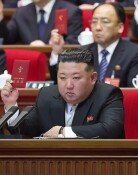Korean Peninsula likely to be key agenda in U.S.-China summit
Korean Peninsula likely to be key agenda in U.S.-China summit
Posted June. 07, 2013 01:01,
Following North Koreas proposal to hold comprehensive talks to discuss issues between the two Koreas including normalizing the Kaesong Industrial Complex, attention is drawn to how the upcoming U.S.-China summit next week deals with Korean Peninsula issues.
Major media outlets around the world project that U.S. President Barack Obama and his Chinese counterpart Xi Jinping will likely treat the Korean Peninsula issues, including the Norths nuclear development, as a key agenda, noting that the attention of the international community is shifting rapidly to the peninsula.
The London-based Financial Times said in its Global Insight column Wednesday, It is 60 years since the Korean Peninsula was at the very centre of international affairs. After the Korean war, the focus moved on to Vietnam, eastern Europe, the Middle East, even to Afghanistan. But Korea now has a good claim to be right back at the centre of global concerns."
Experts agree that Pyongyang made the surprise proposal for talks with an eye to the U.S.-China summit. As Obama and Xi have common interest in eased tensions on the Korean Peninsula and its denuclearization, it is likely that they will support inter-Korean talks.
The second-term Obama administration has asked Seoul to take a leading role in easing tensions on the peninsula and creating an atmosphere for talks. Therefore, the current dialogue mood is a welcome development for them. As Pyongyang made the proposal right after the Chinese president urged talks during his meeting with a North Korean special envoy, Beijing has saved its face.
However, it is unlikely that inter-Korean talks per se will become the starting point for denuclearization as demanded by Washington and Beijing. As North Korea will likely drive a wedge between South Korea and the U.S. by claiming that inter-Korean dialogue is separate from denuclearization talks, the Obama-Xi summit will likely call for the Norths denuclearization while supporting inter-Korean talks. It is possible that the U.S. and Chinese leaders will express their strong expectation that the inter-Korean dialogue will lead to talks for denuclearization.
Meanwhile, the Chinese president, in a speech to the Mexican Senate on Wednesday, quoted Confucius: Do not do unto others what you do not want others do unto you. The quote is meaningful because he cited it just before his visit to the U.S.
China has consistently called for a new type of great power relationship with the U.S., seeking a more equal footing with the U.S. China views that the U.S. is putting pressures from all directions to suppress Chinas rise. Considering the view, some observes interpret Xis quotation of Confucius as a message to the U.S. that reflects his intention to build a new type of great power relationship, in which the U.S. cooperates and competes with China while acknowledging Chinas status as a G-2 country.
Separately, the New York Times reported Wednesday that a much anticipated meeting in California between the first ladies of the two countries didn`t take place, as Michelle Obama remained in Washington with her daughters, whose school year is not over yet.
Stylish Michelle Obama and Peng Liyuan enjoy high popularity among people in their respective countries. Cheng Li, a senior fellow on China policy at the Brookings Institution, said that people will be disappointed. They certainly have very high expectations for this meeting."







